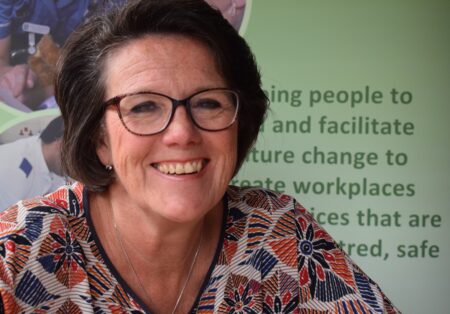Home News & Views Using active work-based learning to facilitate transformation
Using active work-based learning to facilitate transformation

Jo Odell, FoNS Practice Development Facilitator and Inspire Improvement Fellowship Lead
This blog is my third in a series exploring the Practice Development principles published in May 2021 in the International Practice Development in Health and Social Care (2021) (2nd Edition) (Eds Kim Manley, Valerie Wilson and Christine Øye), which I was pleased to contribute to. This blog will explore the active learning principle (Chp 8, pp 99-117) and give examples of how people have put this principle into action:
Practice Development uses active work-based learning to facilitate individual, practice and cultural transformation
Dewing (2008, p273) describes active learning as ‘an approach for in-depth learning that draws on, creatively synthesises and integrates numerous learning methods’ (Dewing, 2008, p 273) and in a blog in November 2020, I wrote about what I believe the difference is between active and passive learning. Essentially for me active learning is a process where we are able to reflect on our practice and is driven by our critical questions from practice. Often passive learning, in my experience is one where one person imparts information to another in the hope that some learning will take place.
An example of a very creative and active learning experience is the use Forum Theatre to help people learn in and from practice. The audience is shown a short play and the subject-matter will usually be something of immediate importance to the audience, often based on a shared life experience. When the play has been performed members of the audience can take to the stage or contribute from the audience and suggest alternative options for how the actors can play out some behaviours or actions. In this way, the event can be used to rehearse for an imminent occasion, or to uncover and analyse alternatives in any situation, past, present or future. The actors explore the results of these choices with the audience creating a kind of theatrical debate, in which experiences and ideas are rehearsed and shared, generating both solidarity and a sense of empowerment. Forum theatre was used in a project to help staff develop ways of having difficult conversations with patients and families at end of life, and is a powerful example of active workplace learning. You can read more about the project here. Or read more about forum theatre here.
Here are some further examples from the Inspire Improvement Fellows about how they created active learning experiences for their teams and for themselves based in practice.
Nicola Richardson – Cardiology team away day: working together to inspire and improve
The greatest challenge at this point was trying to leave the ‘how can we fix this’ mentality and first establish ‘what it’s really like to work around here’ and collectively understand our values as the leadership team. The only way we can create a positive workplace culture is to look at our own individual values and then our team values and work out what our ward culture looks like.
Investing the time in the leadership team has been essential towards culture change within cardiology. The away day involved the participation of the whole team, was more work focused than previous away days and involved more creative methods and thinking outside the box.
Ryan Rukas – Working in new ways
I then decided to use the cards when undertaking a young person and family review. These reviews are usually a pretty standard affair where I ask the child and family how things are with the team and more often than not, I get the same answers from them as I did six months before. Not this time. I had pre-warned the family that this review was going to be different and they were intrigued to know what it was that would be happening. I spread the cards out on the young person’s bed and the family decided they would like to use the picture side rather than the words. I have found that most people prefer the pictures to the words, one carer has previously said that the picture evokes ‘a feeling within them and makes them want to talk about it’.
Vikki Garrick and Amada Barker – Learning in and from practice
As part of the ‘Learning in and From Practice’ ribbon (from the Creating Caring Cultures Model Learning Zone – Culture Change Resources) we decided to undertake a peer review of ‘what’s it like to work round here’ by buddying up and visiting each other’s workplaces. And this experience proved to be (surprisingly!) valuable. It’s so easy to stay on the treadmill and become a very ‘silo thinking’ practitioner – certainly this is the culture many of us work in. However, taking the opportunity to explore others’ workplaces and see how things are done was a really enlightening experience for me.
We would be delighted to hear about how you are creating more active workplace learning opportunities to facilitate individual, practice and cultural transformation.
References
Dewing, J. (2008) Becoming and being active learners and creating. Active learning workplaces: the value of active learning. Chp 14 in McCormack, B., Manley, K. and Wilson, V. (Eds.) International Practice Development in Nursing and Healthcare. Oxford: Blackwell. pp 273-294.
Sally Hardy, Simone Clarke, Irena Anna Frei, Claire Morley, Jo Odell, Chris White and Valerie Wilson (2021) A global manifesto for Practice Development: Revisiting Core Principles. Chapter 8 in International Practice Development in Health and Social Care (2021) 2nd Edition (Eds Kim Manley, Valerie Wilson and Christine Øye)
Comments are closed.

